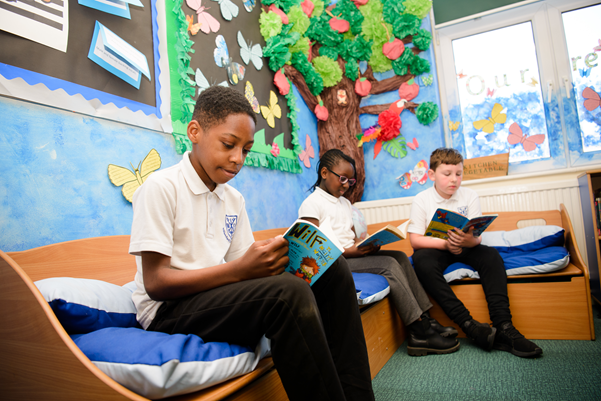English Statement

INTENT
-
Our English curriculum enables pupils to use speaking and listening as well as writing to express themselves and communicate independently for a range of purposes across all areas of the curriculum.
-
Pupils are equipped with the ability to use word choice, style and presentation to have a real effect on the reader.
-
Pupils should be supported to be able to read fluently and confidently as well as for meaning and use these skills to access all other areas of learning.
-
Reading for enjoyment is promoted through whole class texts across the curriculum, World Book Day activities and engaging reading areas.
-
Our English curriculum has purposeful links with other subjects so that our children broaden their understanding and apply their learning to different contexts (for example, in the Year Three English unit of work on Ancient Egyptians links are made with history). There are also opportunities across the curriculum where pupils can practise writing genres such as a biography of Mary Anning in Year Six Science and writing an information booklet for a younger child on communion in Year Four RE.
-
Our English curriculum is coherently planned and sequenced for all our children which follows a clear path of progression as they advance through the KS2 curriculum and beyond.
-
Our English curriculum is ambitious and challenging for all our children, including those with SEND, enabling every child to work to their full potential.
-
Children from all abilities are encouraged to celebrate their success and take pride in their writing through display as well as reading or performing aloud to others.
-
Where appropriate, teachers link English units to our Christain ethos through discussion and debate (for example, children discuss the idea of self-sacrifice and humility when studying The Highwayman in Year 6).
IMPLEMENTATION
-
Our English curriculum uses purposeful and engaging materials and experiences to provide writing opportunities that support as well as challenge our pupils.
-
As part of our English curriculum, enrichment activities across the curriculum are used as an opportunity to link to reading, writing or speaking and listening activities (for example writing a fantasy story based on Night At the Musuem after visiting The Natural History Museum for science in Year Six, listening and responding to an external story teller on Year Five’s Bagdad day and writing about a trip to Colchester Zoo in Year Four).
-
Pupils are exposed to a range of genres from different cultures as well as from differing historical contexts through whole class texts in English, across the curriculum, whole class reading for enjoyment as well as through their home reading books. They also have regular access to a school library, class library and visit the local library twice during KS2.
-
Through our English curriculum as well as across the curriculum, the pupils are exposed to a range of genres of writing modelled by teachers within the school as well as from authors and poets.
-
The key concepts within our English lessons are regularly revisited through our spiral curriculum, this enables our children to know more and remember more about key concepts.
-
Children access their English lessons through high quality teaching during which they participate in a wide range of engaging learning experiences such as independent and collaborative tasks, debate, creative tasks and drama.
-
There is a stong focus on vocabulary in reading and writing as well as through debate and discussion activities and in their oral contributions during lessons.
-
All English lessons build upon prior learning and have clearly defined end points.
-
In English lessons, teachers use questioning to assess pupils’ understanding, misunderstandings and progress.
IMPACT
-
We evaluate the knowledge, skills and understanding that children have gained in their English lessons against carefully planned end points to measure progression.
-
Our English curriculum ensures children have the knowledge and cultural capital to succeed in the next steps of their education.
-
In the monitoring of the English curriculum, we constantly strive for improvement through review and evaluation.
